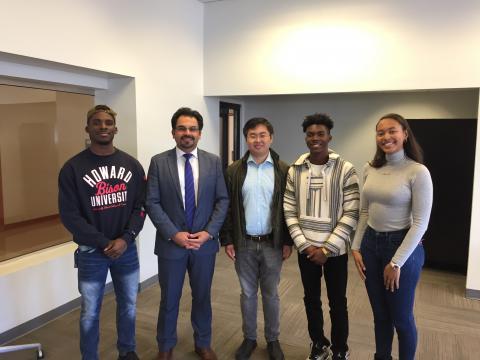CEE Speaker Series Kicked off the Year with “Robust Design of Geotechnical Systems in Urban Environments”

Here’s a little about the subject:
Supported deep excavation in an urban environment is a risky geotechnical operation; failure of retaining wall support system, including excessive deformation of the ground at the site, can have severe adverse effects on adjacent structures, with accompanying adverse social and economic effects. Because of the difficulty in predicting the wall and ground deformations accurately, engineers often face conflicting goals of inefficient design for liability control or under-conservative design for cost-savings.
In traditional geotechnical engineering design, safety requirements are first checked and then design with the lowest cost is usually selected as the final design. However, the lowest cost design may become unsatisfactory if the actual variation of "noise factors" (such as uncertain soil parameters and load conditions) greatly exceeds the level of variation assumed during the design phase. A more rational approach is to achieve design robustness while seeking cost efficiency. To this end, a "Robust Geotechnical Design" methodology is developed, which considers robustness explicitly in addition to cost and safety requirements. Robust Geotechnical Design reduces the variability of the system responses for supported excavations (by achieving robustness against noise factors) and has two distinct benefits. First, it reduces the chance of excavation failure and damages to the adjacent buildings and infrastructures. Second, it allows for a more cost-efficient design because of improved certainty of the system responses.
Furthermore, in the course of construction for excavation projects, instruments are often placed to monitor deformations and to reduce the risk. Successful use of monitoring data to update the system performance is crucial in underground constructions. An approach for probabilistic inverse analysis of supported excavations is also developed. Here, the soil parameters are updated using the monitored deformation data from the staged excavation. The updated soil parameters are then used to refine the predicted wall and ground responses in the subsequent excavation stages. More accurate predictions of the wall and ground responses, in turn, lead to a more accurate assessment of the damage potential of buildings adjacent to the excavation. This approach offers an effective means for adaptive management of urban underground constructions.
And about the speaker:
Lei Wang, Ph.D., P.E., is currently Director of the Civil Engineering Graduate Program, as well as an assistant professor of geotechnical engineering in the Department of Civil Engineering at the University of the District of Columbia. Dr. Wang holds a Ph.D. in civil engineering from Clemson University, an M.S. in geotechnical engineering from Tongji University, and a B.S. in civil engineering from the China University of Geosciences.
Prior to his current position, Dr. Wang worked as an assistant professor of geotechnical engineering at Montana Tech and a geotechnical engineer at the Geotechnical and Tunneling Technical Excellence Center of WSP | Parsons Brinckerhoff on a variety of tunneling, excavation, levee, and embankment projects. He has extensive research experience in geotechnical engineering, including geotechnical risk and reliability, robust design for resilience, underground excavation and tunneling, soil/rock-structure interaction, numerical and centrifuge modeling, earth dams and levees, foundation engineering, and geotechnical earthquake engineering. Dr. Wang has published over 50 refereed journal and conference papers and his research has been funded by NSF, NASA, USDA and NIST. He has also been a recipient of many honors and awards, including the Best Paper Award by Taiwan Geotechnical Society (2013).
And about the Department of Civil and Environmental Engineering’s Speaker Series (and other fun and educational events):
The CEE Speaker Series (CEESS) is a series of events organized by CEE. It brings to campus guest lecturers in interdisciplinary research and practice across the broad areas of civil engineering and beyond to address topics of contemporary, future and timeless significance.
Radiant Internship Sharing Eloquence (CEERISE) is a venue for students to share the lessons that they learned from their internships and demonstrate their achievements through short presentations and Q&A.
CEE Funspiration Night (CEEFuN) is an event that is intended to foster the inquisitiveness of CEE students who relish the challenge of doing the almost impossible, and help them nurture their problem-solving skills through learning from past engineering catastrophes, understanding and fusing ideas underlying engineering accomplishments, and embracing new paradigms. In each CEEFuN, a documentary of a magnificent or disastrous civil engineering project is screened followed by Q&A with a professor of pertinent expertise.
